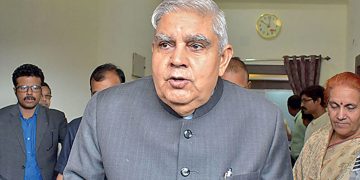PIYUSH ROY
Actress turned director, Konkona Sen Sharma’s, directorial debut, A Death in the Gunj, finally managed its theatrical release this month. After touring various film festivals for nearly a year now, this slice-of-life bilingual in English and Bengali, has wowed critics and viewers alike,despite its belated coming in a crowd of big films. One of the best films of the year so far, A Death in the Gunj, set in the 1970s, unfolds like a diary, depicting seven days of a family’s vacation in McCluskieganj, a forgotten village town in present day Jharkhand.
A family of three, father, mother and their little daughter (Gulsan Devaiah, Tillotama Shome and Arya Sharma) with an Anglo-Indian friend (Kalki Coechlin) and a cousin, Shutu (Vikrant Massey) visit their parents (late Om Puri and Tanuja), residing in a forest estate with a tribal couple as domestic help. Two local men, family friends of Deviah and his parents, a boisterous alpha male and a lost royal played by Ranvir Shorey, and his reserved Anglo-Indian friend, Brian(Jim Sarbh) in complete character contrast, complete the character scape of this vacation story that ends with a tragedy.
The narrative’s ominous outcome is made obvious by its title. Yet, Konkona manages to weave and sustain dread so deftly throughout, that one may be compelled for a second viewing to enjoy at ease the subtle insights into the ‘grey’ in the human psyche that she intimately capturesto relatable discomfiture.
The film begins with an allusion of being inspired by true events, but it does not revolve around anybody famous. Told like a good vacation night story around a family fire on a chilly evening, the surprise is in how ordinary members of any family next door, going about doing ordinary things towards leading a comfortable life, end up becoming intriguing elements of an unexpected story.
At the centre is Shutu, a 23-year-old precarious boy-man, reluctantly coming to terms with having to let go of his teen bearings,as life and relations keep increasingly, and often aggressively nudging him to his callings of youth and a life of responsibility. Nothing about him is instantly appealing. His character’s most appealing trait, vulnerability, too seems like a desperate hanger on, irritatingly halting his tryst with the attractions of being young. Yet, you get drawn to him – his loss, his solitude, his fine observant skills, his sensitivity, furtive silences, unspoken talents and explorative awkwardness. One cannot but miss, the longer shelf life of innocence, in the good old, non-Internet, non-mobile days, three decades back.
Look at any family collective, staying together, on a holiday, in transit even… and you are bound to bump into a Shutu like character – an awkward family member, who is there to attend everyone’s beck and call, used by all without an iota of shame or realisation. He or she is that necessary family extra, whose needs and wants, never get discussed, or acknowledged, until they do something shocking, or outside the routine, for notice. Konkona’s film is a poignant tribute to that every family’s secretly exploited member in its opting to turn the pages of an uneventful diary in a way that the happening and the achieving are revealed at their unflattering worst. With a few strategic strokes of intimate drama in a seemingly not much happening tale, Konkona makes a menace out of the ordinary while offering a seething critique of the self-preserving selfishness in a ‘life-goes-on’ attitude to surviving. For the many unrecognised Shutus in every family, should a violent eruption be the only outlet for a lifetime’s acknowledgement? The horror on the face of his perpetrators makes the film’s gory ending, ironically feel like a conciliatory poetic justice, a cathartic punishing of the proud and the knowing, through an uncanny twist achieved from the seemingly least able.
Bullying is not a public or a faraway bane; it also happens in private spaces of relational intimacy of the best and the finest, rich and the poor. Bullying is a fairly existent family menace, which needs to be exposed or addressed before it’s consequences become too complicated to correct. A Death in the Gunj is Konkona’s acknowledging of another often ignored psychological issue, albeit subtly, which makes this poignant elegy, a must watch, to be discussed and pondered over. Its truth is universal; a keen observer will not leave without some uncomfortable self-reflections.
Konkona’s mother Aparna Sen remains the finest and most acclaimed Indian female director with some commendable, provocative contributions to the cause of issue-based cinema. The promise of that legacy is ably retained in her daughter’s directorial debut. Looking for more meaningful celluloid outings from a sensitive story teller.






































